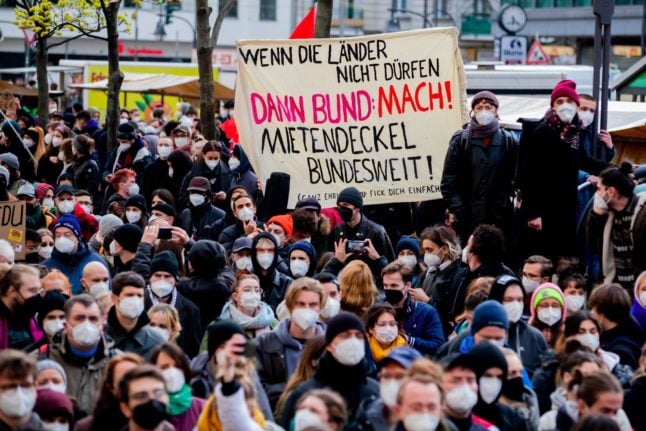On Thursday Berlin’s rent freeze (Mietendeckel) was ruled unlawful by the Federal Constitutional Court, which said rent policy falls under federal law – and not the jurisdiction of Germany’s 16 states.
It was a blow to millions of tenants, many of whom immediately face major rent increases and a bill of hundreds or thousands of euros in backdated payments.
Now the German Tenants’ Association (DMB), politicians and demonstrators are calling for the federal government to act quickly to help ensure affordable housing.
According to the association, a rent regulation covering all of Germany could be implemented within a short period of time.
Head of the renters’ association, Lukas Siebenkotten, said there needed to be a “nationwide rent freeze for existing buildings” and “sharp brakes on re-letting” to limit landlords from hiking up prices on new contracts.
READ ALSO: What the decision to get rid of Berlin’s rent cap means for you
It came as thousands of people – with the majority wearing face masks – demonstrated in Berlin on Thursday for a nationwide rent freeze. They slammed the decision of the highest German court and called for more political action against “rent insanity”. Many of the protesters banged on pots and pans to make noise.
#dwenteignen #Mietdeckel kotti stabil pic.twitter.com/MFuQoXXNXt
— Kotti & Co (@KottiU) April 15, 2021
The Berlin Tenants’ Association had called for the protest, as well as grassroots groups such as the “Expropriate Deutsche Wohnen & Co.” initiative, which wants a a referendum on expropriating from large property developers in a bid to deal with the housing crisis in Berlin.
READ MORE: How Berliner’s are plotting a radical ‘expropriation referendum’ to fight housing crisis
‘Government can act quickly if they want to’
German Tenant’s Association president Siebenkotten said the government had the power to make the changes.
“As you can see from the coronavirus measures, the federal government can act quickly if the political will is there,” he said, adding that proposals for effective and fair rent caps have been on the table for years.
According to Siebenkotten, the implementation of housing laws would even be possible during this legislative period.
Berlin Social Democrats’ (SPD) chairwoman, Family Minister Franziska Giffey, advocates nationwide regulations against excessive rents.
“The task of protecting tenants really effectively against excessive rents must be tackled at the federal level,” said Giffey on rbb-Inforadio.
It is about “tenant protection rules in federal regulations that are made in such a way that they take effect and really work”.
READ ALSO: ‘Bitter setback’: What’s the reaction to Berlin’s rental cap law being scrapped?
Berlin SPD co-leader Raed Saleh said: “Now the ball is in the hands of the CDU and CSU”, adding: “You now have the task of giving up your blockade against a rent moratorium and ensuring more tenant protection.”
Another possibility is for the government to enable the states to regulate rent by law.
“Where rents are actually exploding, as is the case in Berlin, the possibility must also be created of intervening there with a lid, a brake,” said SPD chairwoman Saskia Esken to the Kölner Stadt-Anzeiger newspaper, and the Redaktionsnetzwerk Deutschland (RND).
“And we will have to examine the possibilities of how legal certainty can be created there.”
According to real estate experts at Deutsche Bank Research, the debate about the Berlin rent cap already resulted in rising rents slowing down in all German cities.
There are now concerns that rental price growth will pick up again. Due to the rent freeze Berlin bucked the trend of rising housing costs in 2020, with rents falling by around 11 percent.
Crushing defeat
For the SPD/Greens and Linke (Left) coalition in Berlin, which tried to stop the spiral of steadily rising rents, the constitutional court’s decision is a crushing defeat.
In February 2020, the coalition brought in the Mietendeckel law that froze rents for about 1.5 million apartments at the June 2019 level.
In the event of a tenant moving out of a property, the law stipulated that the old rent would remain or that upper limits would apply.
Rents that were more than 20 percent above the upper limits were considered too high – and since November 23rd 2020, affected landlords have been legally obliged to lower rents for several hundred thousand apartments.
READ ALSO: 7 things you should know when looking for a flat in Berlin
The Berlin law was challenged by MPs in Chancellor Angela Merkel’s Christian Democrats, the Free Democrats as well as some landlords, who said it was “unlawful”.
And on Thursday the Federal Constitutional Court agreed with the challenge, declaring the Berlin law to be null and void.
The rent caps stipulated in the state law no longer apply with immediate effect. The legal situation is now as if the rent freeze had never existed.



 Please whitelist us to continue reading.
Please whitelist us to continue reading.
Member comments